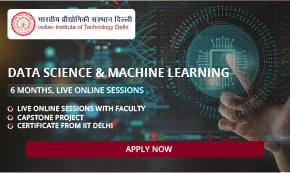Data Science Interview Questions That Will Help You Crack the Interview

Data has become an inevitable part of our lives as most of the things around us are a result of data. Interestingly, data is the reason behind the smooth functioning of most business organizations. Therefore, the importance and role of a data scientist has substantially increased in a company. Moreover, according to Data Quest, an online portal, the demand for data scientists is increasing in India.
In fact, data scientists’ job openings increased by 62% in 2020. This is because many Indian organizations have realized the importance of extracting business data for insights about the business, customer, and competition. So, if you are on the way to becoming a data scientist, here are a few questions that will prepare you for and crack the interview.
Top Data Science Interview Questions
A few basic yet commonly asked data science interview questions are:
- What is data science?
Data science is a multidisciplinary approach that extracts a large amount of data and utilizes them for solving business problems. It is a combination of multiple fields like statistics, artificial intelligence, etc. Data science has slowly paved the way for the business functions of organizations.
2. How is data science different from big data and analytics?
This is one of the top data science interview questions. You can answer it in this way – big data is the raw data generated from various departments of an organization. Big data is only a preliminary function that accumulates large volumes of data, while data science is the advanced function that works on the data to draw meaningful insights. Data science helps in predicting future threats and opportunities. It uses data collected through big data for drawing conclusions.
Big data involves business activities like data management and others. Meanwhile, data science involves business activities like data modelling, data cleansing, analysis, pre-processing etc.
3. What is data cleansing? What are the important steps of data cleansing?
There are high chances of error during collecting, interpreting, and drawing conclusions from data. Hence, many companies undertake data cleansing. It is a process of removing or updating incorrect, repeated, or irrelevant information. It is important to improve the quality of data, so undertaking this process will help in achieving accuracy in data science.
Data cleansing is an important step before analyzing and interpreting data because correct data will help organizations to make informed decisions. A few important steps of data cleansing that you can talk about are:
- Removing duplicate or irrelevant data
- Checking the quality of data
- Looking out for structural errors
- Devising methods to treat missing data
Statistics-related Data Science Interview Questions
- What is the use of statistics in data science?
Statistics plays an important role in data science. It helps the organization in performing various business functions like data acquisition, exploration, analysis, validation, and estimations. Furthermore, many algorithms in data science are built on statistical formulas and processes; therefore, statistics play an inevitable part in data science.
- What is correlation and covariance in statistics?
Correlation and covariance are two mathematical concepts that are widely used in statistics. Here is the detailed meaning of these two mathematical concepts:
- Correlation: It is the best technique to measure the quantitative relationship between two variables. Furthermore, it measures and estimates the relationship between two variables.
- Covariance: It measures the extent of difference between two variables. In statistical terms, covariance measures the relationship between two random variables. It checks whether a change in one variable is reciprocated by the other variable or not.
Advice corner: Do not miss out on preparing for the above-mentioned or similar statistics questions for your data science interview.
Interview Questions Related to Data Analysis
- How data cleansing plays an important role in the analysis?
Data cleansing means the deletion of duplicate or irrelevant data from the model. Here are some of the benefits of regularly cleaning data that you can take note of while preparing for your data science interview:
- Provide a fresh canvas for data scientists or analysts to work with.
- Data Cleaning removes duplicate or irrelevant data, which increases the accuracy of analysis.
- It improves decision-making and boosts results and revenue.
- Difference between univariate, bivariate and multivariate analysis?
Univariate analysis: It is a descriptive statistical analysis technique that aims to describe the data and find patterns that exist in one variable—for example, the height of the students. In Univariate analysis, data scientists would concentrate on one variable (height) and determine different patterns (varying heights of people).
Bivariate analysis: It is a statistical analysis technique that involves two variables. This type of analysis concentrates on cause and relationship. Therefore, the analysis is done to determine the relationship between the two variables.
Multivariate analysis: In this analysis technique two or more variables are involved. It is similar to that of bivariate but consists of more than one dependent variable.
- What is root cause analysis?
Root cause analysis is one of the most important parts of Data analysis. It is the process tracing back an event and the factors that lead to it. It is generally done when a data analysis goes wrong. However, sometimes it is done to help the businesses understand the reasons behind many business outcomes.
Though these data science interview questions may seem easy to answer, it gets perplexing to give definite and crisp answers in the interview. Therefore, we advise you to be prepared with the answers.
Machine Learning in Data Science – Interview Questions
- What is machine learning?
Machine learning is a branch of artificial intelligence (AI) and computer science that focuses on using data and algorithms to emulate human-like qualities to an application. Machine learning provides systems with the ability to learn and improve from their experience without being programmed. Machine learning focuses on developing computer programs that can access data and use it to interpret itself without any human assistance.
2. What is supervised and unsupervised learning?
Supervised learning trains the model to use data from the labelled folder. A supervised learning algorithm learns from labelled training data and helps you predict future events.
Meanwhile, unsupervised learning is the exact opposite of it. Unsupervised learning is a type of machine learning technique where you need not to supervise the model. Instead, the model discovers information on its own.
Data Science Technical Interview Questions
- What is scientific visualization?
Scientific visualization represents data in a graphic form. It gives an insight into the data with the use of graphs and bars. This method is also known as visual data analysis. Although this method has many positives, there are downsides to it. For instance, this method does not accurately present the data, and it just gives an estimation. Therefore, it may be hard to gain insight based on this method alone.
2. What are some common data quality issues that data scientists usually face while dealing with big data?
Big data is a good way to draw different types of data. However, one of the major problems with big data is that there is the generation of duplicate data, incomplete data, and incorrect data, among others.
We have covered most of the facets of data science in this article. Therefore, there is high chance that you’ll be asked similar questions in your data science interview.
As the data science and analysis sector has gained prominence in India in the last decade, the need, value and significance of data science has increased to a large extent, thereby, increasing job opportunities. So, if you wish to gain deeper knowledge about data science in order to be well-versed in the field, consider pursuing executive data science courses offered by Emeritus.
Emeritus India provides world-class executive education to individuals from different parts of the world. We have partnered with top institutes like the Indian Institute of Management (IIM) Lucknow, IIM Calcutta, and Indian School of Business (ISB) to create impactful executive education programmes.







